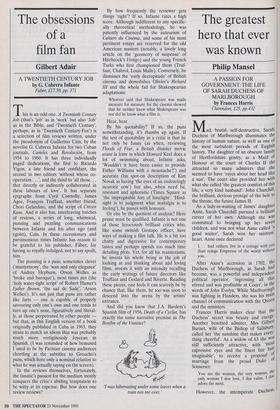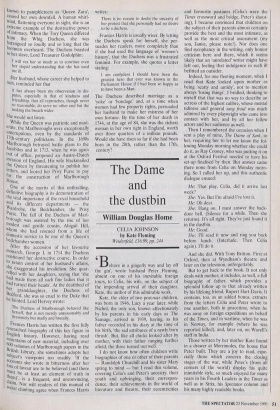The greatest hero that ever was known
Philip Mansel
A PASSION FOR GOVERNMENT: THE LIFE OF SARAH DUCHESS OF MARLBOROUGH by Frances Harris Clarendon, £25, pp.432 Mad, brutal, self-destructive, Sarah, Duchess of Marlborough illuminates the history of human nature, as well as one of the most turbulent periods of English history. The daughter of an obscure farnilY of Hertfordshire gentry, as a Maid of Honour at the court of Charles II she attracted so many admirers that she seemed to have `rayes about her head like a sun'. The court also provided her with what she called 'the greatest comfort of this life, a very kind husband': John Churchill, the brilliant, devious protégé of the heir to the throne, the future James II.
As a lady-in-waiting of James' daughter Anne, Sarah Churchill pursued a brilliant career of her own. Although she was committed to bringing up her seven children, and was not what Anne called good waiter', Sarah won her mistress heart. Anne once declared
I. had rathere live in a cottage with Yoli
than reinge Empresse of the world without you.
After Anne's accession in 1702, the Duchess of Marlborough, as Sarah had become, was a powerful and independent political operator, ingrossing all that stirred and was profitable at Court', in the words of John Evelyn. While Marlborough was fighting in Flanders, she was his main channel Of communication with the Queen and the ministers.
Frances Harris makes clear that the Duchess' secret was beauty and energY. Another besotted admirer, Mrs Gilbert Burnet, wife of the Bishop of Salisbull, called her 'the sunshine that makes everY" thing cheerful'. As a widow of 63 she was still sufficiently attractive, with `1110s.t exPressive eyes and the finest fair imaginable', to receive a proposal ot, marriage from the proud Duke 01 Somerset: You are the woman, the very woman, thc only woman I doe love, I doe value, I doe adore the most.
However, the intemperate Duchess,
known to pamphleteers as 'Queen Zara', caused her own downfall. A human whirl- wind, flattening everyone in sight, she is an extreme example of the destructive power of intimacy. When the Tory Queen differed from the Whig Duchess, she was harangued so loudly and so long that the footmen overheard. The Duchess boasted to her slave, Lord Treasurer Godolphin: I will vex her so much as to convince even her stupid understanding that she has used me ill.
Her husband, whose career she helped to ruin, reminded her that
it has always been my observation in dis- putes, especially in that of kindness and friendship, that all reproaches, though never SO reasonable, do serve no other end but the making the breach wider.
She would not listen.
While the Queen was patriotic and mod- erate, the Marlboroughs were exceptionally unscrupulous, even by the standards of 17th-century politicians. In the 1690s Marlborough betrayed battle plans to the Jacobites and in 1713, when he was again out of office, proposed an Austro-Dutch invasion of England. His wife blackmailed the Queen by threatening to publish her letters, and looted her Privy Purse to pay for the construction of Marlborough House, One of the merits of this enthralling, definitive biography is its demonstration of the vital importance of the royal household and its different departments — the Wardrobe, the Bedchamber, the Privy Purse. The fall of the Duchess of Marl- borough was assisted by the rise of her Modest and gentle cousin, Abigail Hill, Whom she had rescued from a life of domestic service to be one of the Queen's bedchamber women.
After the accession of her favourite monarch, George I, in 1714 the Duchess continued her destructive course. In order t° retain control of her husband's affairs, She exaggerated his invalidism. She quar- felled with her daughters, saying that `she ad made them all such fine ladies that it had turned their heads'. At the deathbed of ,her granddaughter, the Duchess of Bedford, she was so cruel to the Duke that he fainted. Lord Hervey wrote:
The Duchess of Marlborough behaved like herself, that is not merely unreasonably and tiresomely but madly and brutally.
Frances Harris has written the first fully researched biography of this key figure in English history. However, having read Mountains of new material, including over 6,09 volumes of Marlborough papers in the tintish Library, she sometimes adopts her subject's viewpoint too readily. 'If the ,accounts she wrote in bitterness after her I of favour are to be believed (and there Ilust be at least an element of truth in n, eM), is a frequent, and unconvincing, clam'. Nor will readers of this manual of st3clal climbing agree when Frances Harris
writes:
There is no reason to doubt the sincerity of her protest that she personally had no desire to be a duchess.
Frances Harris is usually wiser. By letting the Duchess speak for herself, she per- suades her readers, more completely than if she had used the language of `women's history', that the Duchess was a frustrated feminist. For example, she quotes a letter stating:
I am confydent I should have been the greatest hero that ever was known in the Parliament House if I had been so happy as to have been a Man.
The Duchess described marriage as a `yoke' or `bondage' and, at a time when women had few property rights, persuaded her husband to make her mistress of her own fortune. By the time of her death in 1744, at the age of 84, she was the richest woman in her own right in England, worth over three quarters of a million pounds. Would she have risen so far if she had been born in the 20th, rather than the 17th, century?









































































 Previous page
Previous page